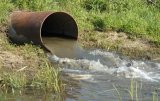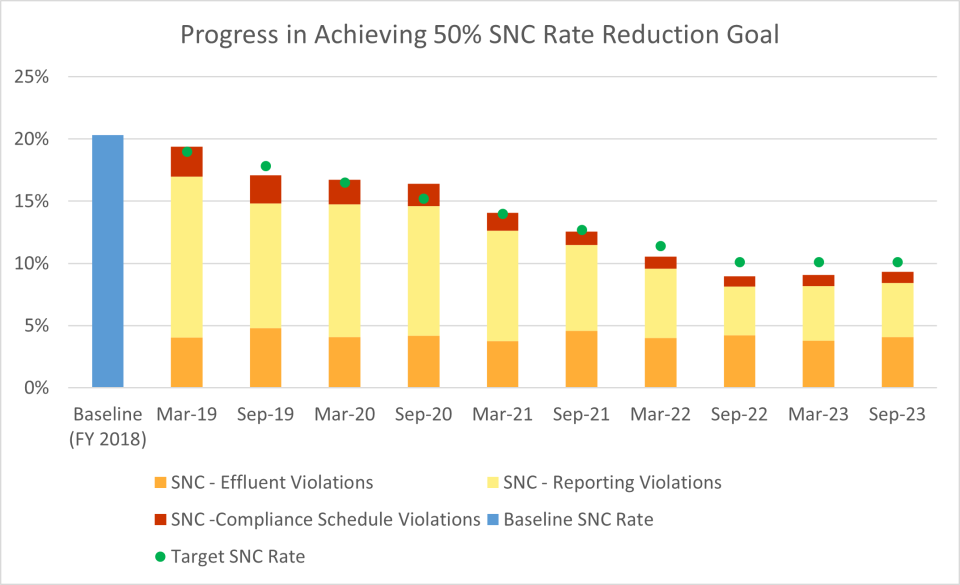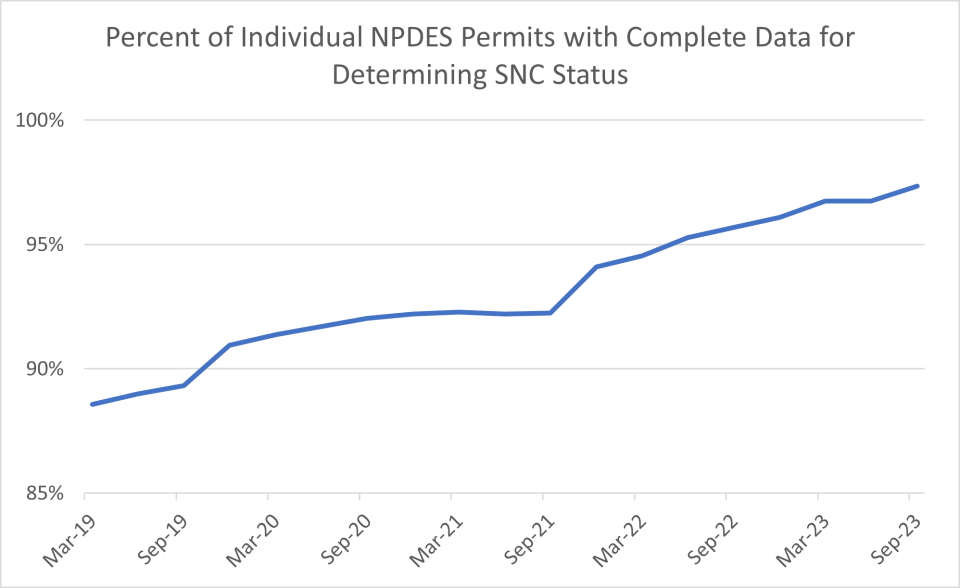National Enforcement and Compliance Initiative: Reducing Significant Non-Compliance with National Pollutant Discharge Elimination System (NPDES) Permits
Problem

Compliance with the Clean Water Act’s National Pollutant Discharge Elimination System (NPDES) permits is critical to protecting our nation’s waters. There are approximately 46,000 major and minor individually NPDES-permitted facilities in the United States. In fiscal year (FY) 2018, 20.3% of these facilities were in significant noncompliance (SNC) with their permits. Types of SNC violations range from significant exceedances of effluent limits, which can cause harm to human health and the environment to failure to submit reports that can mask serious deficiencies.
Goal
The objective of this National Enforcement and Compliance Initiative (NECI) is to improve surface water quality by assuring that all NPDES permittees are complying with their permits. Improving surface water quality protects public health and reduces potential pollution impacts on drinking water supplies, aquatic life, and public enjoyment of fishable and swimmable waters.
The initial goal of this NPDES permits NECI is to cut the national FY 2018 baseline SNC rate of 20.3% in half by the end of FY 2022, while assuring that the worst SNC violators are timely and appropriately addressed.
Results
From FY 2020 through FY 2023, EPA made significant progress in reducing significant violations of NPDES permits. The following examples describe some of the Agency’s efforts and successes in FY 2023 to improve compliance and water quality through this initiative:
-
Reduced the rate of significant noncompliance with NPDES permits
- Coordinated with NPDES authorized states to achieve an FY 2023 SNC rate of 9.3% from an FY 2018 baseline of 20.3%, demonstrating that a SNC rate that is half the baseline rate is sustainable.
- Utilized EPA targeting tools to highlight SNC-level violators that may be in or near overburdened communities to increase EPA regional and state attention to these violators.
-
Successfully Resolved Enforcement Cases
- EPA has addressed serious violations through enforcement actions. Examples of recently concluded enforcement actions for NPDES permit violations include the following:
- United States and Commonwealth of Massachusetts Announce Settlement with City of Gloucester to Upgrade Sewage Treatment Infrastructure
- Eastman Chemical Resins Inc. to pay $2.4 million penalty for multiple environmental violations at West Elizabeth Pa. facility
- Messer LLC to pay $1.9 million penalty for Clean Water Act violations at New Cumberland, WV facility
- City of Sandy must pay $500,000 in penalties, limit sewer hookups under new agreement with EPA, USDOJ, DEQ
- EPA Fines the Ritz-Carlton Resort on St. Thomas, USVI for Violations of the Clean Water Act
- EPA Fines Knouse Foods of Central PA $230,000 for 120 Violations of Pollution Laws
- Criminal Case:
- View, Inc.: View is a manufacturer of electrochromic glass products, headquartered in Milpitas, CA but has a manufacturing facility in Mississippi. Over a nine-year period, from mid-2012 to June 2021, View discharged 250K gallons per day of wastewater, which contained metals such as cadmium, chromium, copper, nickel, and zinc, without a pretreatment permit. View was sentenced to 3 years of probation, a $3 million fine and ordered to make a community service payment of $450,000 to local wastewater treatment facility. View also paid a $1.5 million civil penalty to the Mississippi Commission on Environmental Quality.
- EPA has addressed serious violations through enforcement actions. Examples of recently concluded enforcement actions for NPDES permit violations include the following:
-
Forged successful partnerships
- Held quarterly discussions with all 47 NPDES authorized states focused on reducing SNC and to help ensure that the most serious SNC-level violators in the state are being addressed.
- Hosted “Improving Small Municipal Wastewater Treatment Plant Compliance,” a national symposium for federal, state, and tribal NPDES regulators. Presentations provided information on tools pertaining to technical assistance, technology, financial support, and more to improve compliance at small wastewater treatment plants.
-
Provided compliance assistance
- Continued to implement EPA’s Compliance Advisor technical assistance program for small systems: In FY 2023, the program provided support to 62 small wastewater systems. Since its inception in FY 2020, the program has provided support to 73 small wastewater systems in 10 states, with the majority of these systems in disadvantaged or underserved communities.
- Established a highly successful technical assistance webinar series that focused primarily on helping operators solve common compliance problems at small wastewater facilities in SNC. Held a total of 45 webinars from FY 2020 to FY 2023, with nine of the webinars in FY 2023.
- Issued “Tips for Submitting Timely, Accurate, and Complete NPDES Discharge Monitoring Reports” (June 2023), a Compliance Advisory focused on monitoring and reporting requirements and to help NPDES permittees comply with Discharge Monitoring Report (DMR) submission requirements in their permit to avoid noncompliance.
Between FY 2020 and FY 2022, EPA issued four additional SNC Compliance Advisories:- Federal Facility Compliance Under EPA’s National Compliance Initiative to Reduce Significant Noncompliance with CWA NPDES Permits (December 2020),
- Compliance Advisory: Clean Water Agencies Increasing Attention to Significant Non-Compliance Dischargers (September 2020),
- Compliance Tips for Small Wastewater Treatment Lagoons with Clean Water Act Discharge Permits (March 2022), and
- Compliance Tips for Small, Mechanical Wastewater Treatment Plants (March 2022).
-
Improved data transfer processes
- Worked closely with several states to improve electronic transfer of data from state systems to EPA’s data system.
Percent of Individual NPDES Permittees in SNC during the Fiscal Year

Number of Individual NPDES Permits with Complete Data for Determining SNC Status
EPA has determined that some individual NPDES permits have insufficient permit information and compliance tracking data in EPA’s database to allow the EPA to evaluate the permittee’s compliance status, including SNC. EPA excludes such permits from the SNC rate calculation to improve the accuracy of the SNC rate. The SNC NECI effort includes goals for addressing this problem to increase the number of individual permits included in the SNC rate calculation. The chart below illustrates progress on this work. At the end of FY 2022, there was complete data for 44,015 out of approximately 46,000 permits.

